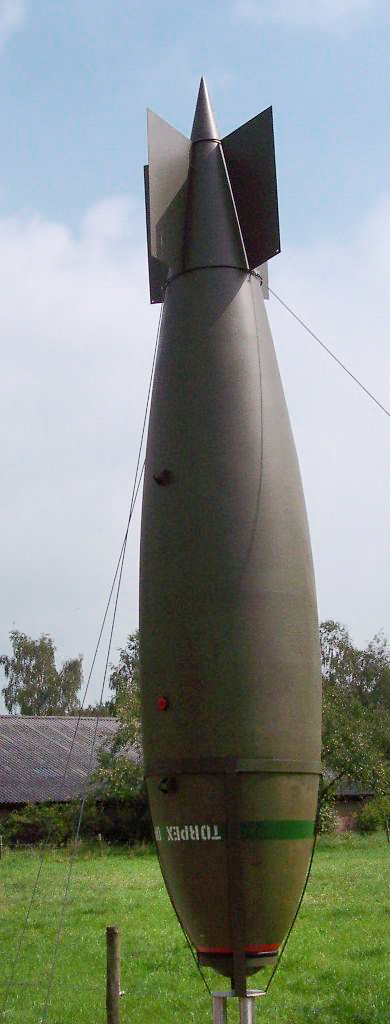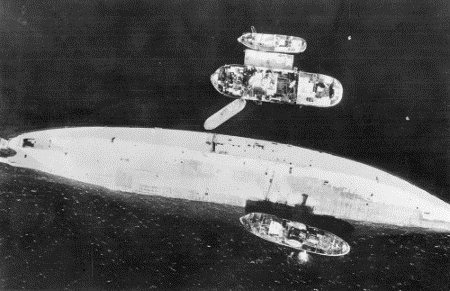paulcadogan wrote:
The damage done by that unfortunate part of the otherwise pretty good Channel 4 documentary endures.....
I actually had in mind Ted Briggs description of a "gust" of flame coming up around the area of the forebridge tower , and the damage/lack of ship section found in this area during the first survey of the wreck .
This indicates to me cordite propellant burning off .
What would be the source ?
There was a U P rocket mounting on top of B turret , which presumably had the same provision of "ready-use" reload rocket rounds as did the ones aft on the shelterdeck which we know caused the superficial big fire in that ( boatdeck ) area , so that is one possible source for cordite flame gusts . But not for a whole section of the hull missing .
All other munition was in "fixed" or rifle cartridge type rounds - 0.5 cal mg , 40mm pompom , 4 inch HA AA , leaving main 15 inch propellant charges as the other possible source .
Some few charges are actually held in the turrets , as "ready-use" munition in case of a supply stoppage , so there is a second possible source .
Some munition would be en-route to the guns and these charges , which may well have been out of their tin containers , are in my view a more plausible source .
Lastly there are the main propellant magazines themselves , which would have still held nearly all of the hundred plus rounds per gun that was the capacity , but as there was no Barham-type ( or Roma type ) detonation , this does not seem to have occurred in Hood .
Let me bring you up to speed Hammy... That theory has been completely refuted and laid to rest by Bill Jurens (who was on the expedition) with the support of other forensic experts. It should never have been made public as it was never supported by evidence. Hood's forward section submerged intact (as witnessed by the survivors, the PoW's observers and the Germans) and broke apart due to implosive forces during the plunge to the bottom.
Hum ! I have the greatest repect for Bill Jurens work and having studied a number of his posts on highly technical subjects elsewhere in the forum I am aware that his expertise is way , way in advance of my own Hobbyist knowledge , however , the " forensic investigation " consisted of the study of remote images of a limited area of a very fragmented wreck site , and of very limited areas of the wrecked ship - much imbedded in sediment , or otherwise hidden from view .
I am aware of the reasons for the "look but dont touch" policy , and that of not trying to look inside the wreck , and I support them fully , but the imposed constraint on the investigation was there , and must be given due weight in considering the conclusions made .
We should not ascribe to the work done at the time , or all the study since , any unwarranted belief that it represents the last word , or some final , definitive , fully authorative statement of fact which answers all questions , for ever , amen !
I'm sure the authors would not claim that .
You certainly would not accept this level of investigation as adequate for a "murder" scene , and I wonder if the term "Forensic " is unfortunately taken in the sense of meaning a comprehensive "crime scene" type of exhaustive investigation , when I am sure that all that was intended was to convey that the study and findings were to be strictly along the lines of rigourous scientific enquiry , and evidence based , with a minimum of speculation .
Implosion effects in a strongly built and complicated riveted hull do not blow areas of the ship to smithereens .
The result of water pressure squeezing air-containing "water tight" compartments is to squeeze inwards the centre of unsupported plating until the riveted seams give way , the water then bursting inward to equalise the pressure .
It doesn't need to open more than a few percent of the plate or seams to do this .
You can see this clearly on the Hood wreck images in the inverted midships double bottom area .
This is NOT what we are looking at from the conning tower forward to the forecastle . The decks above the main armoured deck and below the forecastle deck were mostly crew mess spaces etc . While I would expect to see them ripped about or crushed , I would not expect to not see the area at all !
With regard to the conning tower , I hadn't come across this one before , ie the suggestion that it was launched out of the hull like a giant rocket . Of course , the ship is constructed so that the tower sits on/in the structure , it is not intended to dangle from it , any more than boilers or turbines or turrets or "fighting masts" are , they mostly fall / tear away at high inclinations or inversion .
Given the shape/weight of the CT I can agree it is probably close to vertically below where it seperated from the hull .
Plus, if the forward mags had gone up, there would have been no survivors...
Hum again ! Plausibly YES if there was a Barham type detonation -- that , plus the cold water , could well have done for everyone , but in a partial explosion/deflagration ?
( Dont forget that , despite her awe inspiring and cataclysmic end , survivors of the Barham - in the warmer waters of the Mediterranean , and with prompt arrival of rescueing friendly ships closeby - numbered some hundreds .)
I viewed it , but I'm still not convinced either way . Also , saying "I do not agree with you" is not the same thing as refutation .
I'm afraid that , pending future expeditions to the wreck and further study , the issues are going to have to lay in the "Pending-too difficult" tray for now.
It may be helpful at this point to restate the difference between "Burning" and "Exploding" propellant charges , which is simply a matter of speed ;- if the flame - front does not exceed the speed of sound , then you hear a loud hiss or whoosh , accompanied by the "gust of flame" . If the flame - front DOES exceed the speed of sound , then you get the bang .
Propellant charges are designed to burn ( very fast ) rather than explode . When present in large quantities (tons) , confined or over-heated , they can be induced to explode rather than burn . Both are referred to as "deflagration".








